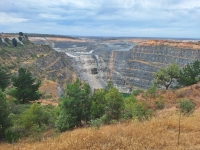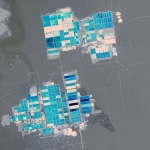West Australian Community Wins Review of Talison Lithium Mine Expansion

Photo: John Clear. Used under Creative Commons license.
The Western Australia Environmental Protection Authority has agreed to conduct a full environmental assessment of Talison Lithium’s plans for a major expansion of the Greenbushes lithium mine, the largest in the world, after 95 percent of the 364 comments submitted to the agency demanded action.
Talison Lithium is a joint venture between Tianqi Lithium, a subsidiary of Chengdu Tianqi Industry Group, based in Chengdu, Sichuan province in China, and Albemarle Corporation, based in Charlotte, North Carolina. Tianqi holds a controlling stake.
Greenbushes is a small town located 250 kilometres south of Perth. Mining has taken place in the area for over 130 years – starting with tin in the 1880s, then tantalum in 1950s, and most recently for lithium in the 1980s. Demand is high for lithium today because it is the lightest metal and a very good conductor of heat and electricity making it a key ingredient for rechargeable batteries for electric cars and smartphones.
Tianqi bought the Greenbushes mine in 2012 and sold a minority stake to Albemarle the following year. The joint venture also operates four processing plants: one that produces technical grade lithium concentrates, two that produce chemical grade lithium concentrates; as well as one to extract lithium from historic waste.
In April 2025, Talison Lithium asked for permission to expand the mine's footprint by 619 hectares, almost one third more than it's current size to dump more waste and to build a new chemical grade plant.
This provoked an immediate reaction from local residents.
"Plants have a white layer of dust over them. The orange trees [have] got constant dust on them, the children's play equipment … the primary school," Glenn Collier, a resident of Greenbushes, told ABC Radio Perth.
"I have three young children and being here 24/7 with the dust causes sticky dry eyes, itchy eyes, skin conditions, coughing," Harlee Perrin told ABC, who lives less than one kilometer from the blast zone.
"It's just constantly breathing in toxic dust, and at night-time just constant noise. You can't sleep," Monte Ling, another resident of Greenbushes told ABC. "Just the worst cough I've ever had in my life. My eyes are just sticky and gooey, and [I'm] going mad."
“Once-quiet communities are being reshaped by industrial noise, dust, heavy haulage, and a growing sense that decisions are being made without proper public scrutiny,” wrote Kelli Gilles, a resident of the nearby town of Bridgetown, and the founder of the Bridgetown/Greenbushes Mine Watchdog. “The approvals have advanced rapidly, and key details, including unregulated water access, noise exemptions, and the visual and ecological impact of new waste rock landforms, have largely escaped wider media attention.”
She recently posted a petition on change.org, which has received over 150 signatures.
One of the signatories commented on the petition: “Next to gigantic walls of the mine there was once a peaceful farm with mobs of emus and kangaroos grazing in the afternoon. It was such a delight to see as you drove out of Bridgetown. Now they have cut a bitumen road across the paddock which is huge and you rarely see these animals. It's heartbreaking. The whole thing now is so visible, it looks like a monster rising out of the beautiful forest.”
Government officials are sympathetic to the residents. "They (Talison) have to be held accountable against those issues, but also they have to be held accountable against their social licence to operate," Roger Cook, the premier of Western Australia state, said in a press statement.
Company CEO Rob Telford has attempted to tamp down the anger. "We deeply regret the impacts felt by members of the Greenbushes community," Telford said in a press statement. "I have made it a priority to personally meet face-to-face with some of our most affected residents to hear firsthand about their experiences. While we cannot undo them, we will work hard to rebuild trust and create a transparent path forward."
Western Australia Environmental Protection Authority now says it will conduct a full public review in 2026. Meanwhile, the company is facing financial difficulties because the price of lithium has plunged from a high of US$6,000 a tonne to $1,000 a ton today.



